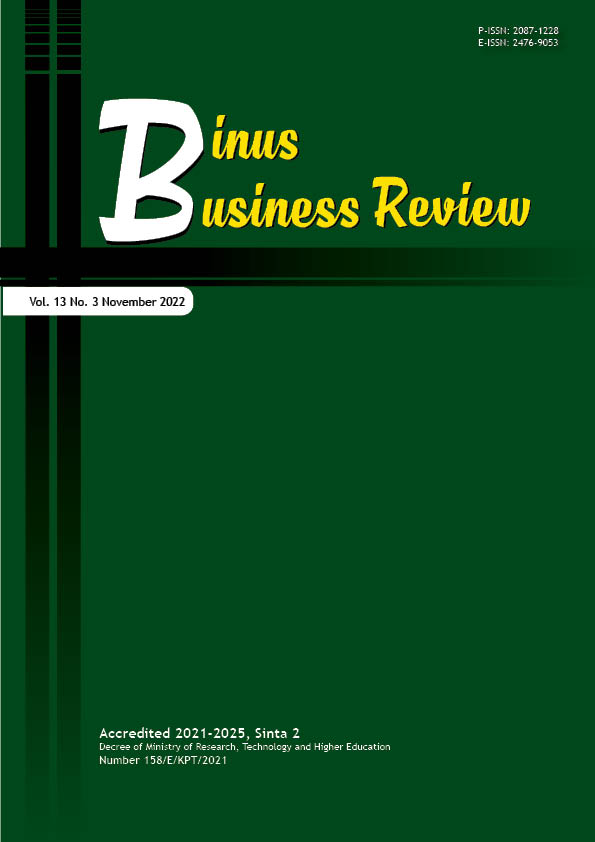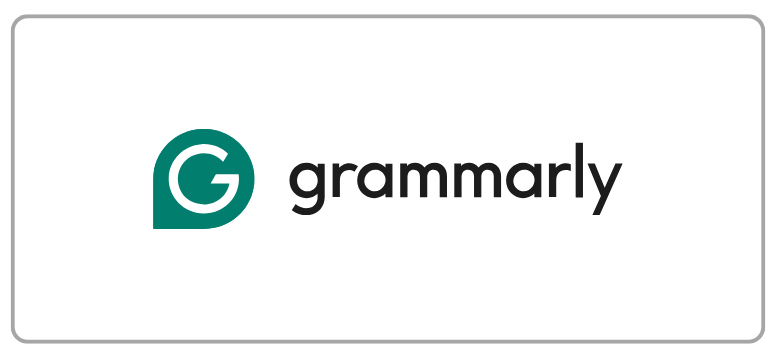Social Media Marketing through Instagram and Repurchase Intention: The Mediating Role of Customer Engagement
DOI:
https://doi.org/10.21512/bbr.v13i3.8576Keywords:
social media marketing, repurchase intention, customer engagement, InstagramAbstract
In the digital era, the presence of social media has a strategic function in marketing that can be optimized to strengthen the company’s competitiveness. Besides having an essential role in promoting products and services quickly and massively, social media is also effective in building relationships with customers. Therefore, the company’s ability to optimize social media is a key success factor in winning the competition. The research aimed to determine the effect of social media marketing through Instagram on repurchase intention mediated by customer engagement. The research applied a quantitative approach and involved a sample of 102 Kopi Chuseyo Instagram followers taken through a simple random sampling technique. Data were collected using a questionnaire. Then, a quantitative approach with path analysis was used to analyze the research data. Research findings show that social media marketing has a significant effect on customer engagement and repurchase intention. The findings also mention that customer engagement affects repurchase intention positively and significantly. In addition, customer engagement also mediates the effect of social media marketing on repurchase intention. Therefore, companies should identify the appropriate type of social media according to their products and services to support marketing programs. They should also focus on certain social media to run its marketing program.
References
Abekah-Nkrumah, G., Antwi, M. Y., Braimah, S. M., & Ofori, C. G. (2021). Customer relationship management and patient satisfaction and loyalty in selected hospitals in Ghana. International Journal of Pharmaceutical and Healthcare Marketing, 15(2), 251–268. https://doi.org/10.1108/IJPHM-09-2019-0064
Abu-Rumman, A. H., & Alhadid, A. Y. (2014). The impact of social media marketing on brand equity: An empirical study on mobile service providers in Jordan. Review of Integrative Business and Economics Research, 3(1), 315–326.
Ahn, J., & Back, K. J. (2018). Antecedents and consequences of customer brand engagement in integrated resorts. International Journal of Hospitality Management, 75(September), 144–152. https://doi.org/10.1016/j.ijhm.2018.05.020
Alalwan, A. A., Rana, N. P., Dwivedi, Y. K., & Algharabat, R. (2017). Social media in marketing: A review and analysis of the existing literature. Telematics and Informatics, 34(7), 1177–1190. https://doi.org/10.1016/j.tele.2017.05.008
Amoako, G. K., Kutu-Adu, S. G., Caesar, L. D., & Neequaye, E. (2019). Relationship marketing and repurchase intention in Ghana’s hospitality industry: An empirical examination of trust and commitment. Journal of Relationship Marketing, 18(2), 77–107. https://doi.org/10.1080/15332667.2018.1534059
Anjani, A. P. (2021). Analysis of product variation and service quality on repurchase intention mediated by customer satisfaction. International Journal of Review Management Business and Entrepreneurship (RMBE), 1(2), 295–309. https://doi.org/10.37715/rmbe.v1i2.2435
Arora, L., Singh, P., Bhatt, V., & Sharma, B. (2021). Understanding and managing customer engagement through social customer relationship management. Journal of Decision Systems, 30(2–3), 215–234. https://doi.org/10.1080/12460125.2021.1881272
Belanche, D., Cenjor, I., & Pérez-Rueda, A. (2019). Instagram Stories versus Facebook Wall: An advertising effectiveness analysis. Spanish Journal of Marketing - ESIC, 23(1), 69–94. https://doi.org/10.1108/SJME-09-2018-0042
Calderón-Monge, E., & RamÃrez-Hurtado, J. M. (2021). Measuring the consumer engagement related to social media: The case of franchising. Electronic Commerce Research, 22, 1249–1274. https://doi.org/10.1007/s10660-021-09463-2
Chan, T. M., Stukus, D., Leppink, J., Duque, L., Bigham, B. L., Mehta, N., & Thoma, B. (2018). Social media and the 21st-century scholar: How you can harness social media to amplify your career. Journal of the American College of Radiology, 15(1), 142–148. https://doi.org/10.1016/j.jacr.2017.09.025
Chauke, X. D., & Dhurup, M. (2017). A Generation X cohort analysis of e-shoppers: Satisfaction, loyalty and repurchase intentions in a developing country. Journal of Social Sciences, 52(1–3), 145–154. https://doi.org/10.1080/09718923.2017.1359908
Cheung, M. L., Pires, G., & Rosenberger, P. J. (2020). The influence of perceived social media marketing elements on consumer–brand engagement and brand knowledge. Asia Pacific Journal of Marketing and Logistics, 32(3), 695–720. https://doi.org/10.1108/APJML-04-2019-0262
Chuah, S. H. W., Sujanto, R. Y., Sulistiawan, J., & Aw, E. C. X. (2022). What is holding customers back? Assessing the moderating roles of personal and social norms on CSR’S routes to Airbnb repurchase intention in the COVID-19 era. Journal of Hospitality and Tourism Management, 50(March), 67–82. https://doi.org/10.1016/j.jhtm.2021.12.007
Dissanayake, D. M. R., Siriwardana, A., & Ismail, N. (2019). Social media marketing and customer engagement: A review on concepts and empirical contributions. Kelaniya Journal of Management, 8(1), 71–85. https://doi.org/10.4038/kjm.v8i1.7592
Djohan, S. A., Handhana, D., Castafiore, V. B., & Hendriana, E. (2022). Can gamification stimulate customers to repurchase in the e-marketplace? The mediation effect of customer experience and engagement. Budapest International Research and Critics Institute (BIRCI-Journal): Humanities and Social Sciences, 5(1), 4781–4796.
Ekarina. (2020). Tren bisnis kedai kopi 2021: Harga makin terjangkau, kualitas bersaing. Retrieved April 15th 2022 from https://katadata.co.id/ekarina/berita/5fa93cddb3869/tren-bisnis-kedai-kopi-2021-harga-makin-terjangkau-kualitas-bersaing
Escobar-RodrÃguez, T., Grávalos-Gastaminza, M. A., & Pérez-Calañas, C. (2017). Facebook and the intention of purchasing tourism products: Moderating effects of gender, age and marital status. Scandinavian Journal of Hospitality and Tourism, 17(2), 129–144. https://doi.org/10.1080/15022250.2015.1137784
Guha, S., Harrigan, P., & Soutar, G. (2018). Linking social media to Customer Relationship Management (CRM): A qualitative study on SMEs. Journal of Small Business & Entrepreneurship, 30(3), 193–214. https://doi.org/10.1080/08276331.2017.1399628
Hair, J. F., Black, W. C., Babin, B. J., & Anderson, R. E. (2019). Multivariate data analysis (8th ed.). Cengage Learning.
Hampton, H., Foley, A., Del Rio, D. F., Smyth, B., Laverty, D., & Caulfield, B. (2022). Customer engagement strategies in retail electricity markets: A comprehensive and comparative review. Energy Research & Social Science, 90(August), 1–17. https://doi.org/10.1016/j.erss.2022.102611
Hapsari, R., Clemes, M. D., & Dean, D. (2017). The impact of service quality, customer engagement and selected marketing constructs on airline passenger loyalty. International Journal of Quality and Service Sciences, 9(1), 21–40. https://doi.org/10.1108/IJQSS-07-2016-0048
Hardani, Andriani, H., Ustiawaty, J., Utami, E. F., Istiqomah, R. R., Fardani, R. A., Sukmana, D. J., & Auliya, N. H. (2020). Metode penelitian kualitatif & kuantitatif. CV. Pustaka Ilmu Group.
Hikmah, A. N., & Riptiono, S. (2020). Pengaruh customer engagement dan e-service quality terhadap online repurchase intention dengan customer satisfaction sebagai variabel intervening pada marketplace Shopee. Jurnal Ilmiah Mahasiswa Manajemen, Bisnis dan Akuntansi (JIMMBA), 2(1), 89–100. https://doi.org/10.32639/jimmba.v2i1.447
Ho, M. H. W., & Chung, H. F. L. (2020). Customer engagement, customer equity and repurchase intention in mobile apps. Journal of Business Research, 121(December), 13–21. https://doi.org/10.1016/j.jbusres.2020.07.046
Islam, J. U., Hollebeek, L. D., Rahman, Z., Khan, I., & Rasool, A. (2019). Customer engagement in the service context: An empirical investigation of the construct, its antecedents and consequences. Journal of Retailing and Consumer Services, 50(September), 277–285. https://doi.org/10.1016/j.jretconser.2019.05.018
Itani, O. S., Krush, M. T., Agnihotri, R., & Trainor, K. J. (2020). Social media and customer relationship management technologies: Influencing buyer-seller information exchanges. Industrial Marketing Management, 90(October), 264–275. https://doi.org/10.1016/j.indmarman.2020.07.015
Jung, A. R. (2017). The influence of perceived ad relevance on social media advertising: An empirical examination of a mediating role of privacy concern. Computers in Human Behavior, 70(May), 303–309. https://doi.org/10.1016/j.chb.2017.01.008
Kemp, S. (2022). Digital 2022: Indonesia. Retrieved April 21st 2022 from https://datareportal.com/reports/digital-2022-indonesia
Khan, R. U., Salamzadeh, Y., Iqbal, Q., & Yang, S. (2022). The impact of customer relationship management and company reputation on customer loyalty: The mediating role of customer satisfaction. Journal of Relationship Marketing, 21(1), 1–26. https://doi.org/10.1080/15332667.2020.1840904
Khoirunnisa, A., & Astini, R. (2021). The effects of experiential marketing and social media marketing on repurchase intention with brand trust as variable mediation for wearing Klamby hijab fashion products. European Journal of Business & Management Research, 6(6), 35–41.
Kopi Chuseyo. (2022). Gaet komunitas k-pop, kunci keberhasilan Kopi Chuseyo. Retrieved June 10, 2022, from https://kopichuseyo.com/komunitas-kpop-keberhasilan-kopi-chuseyo/
Krasniak, M., Zimmerman, J., & Ng, D. (2021). Social media marketing all-in-one for dummies. John Wiley & Sons.
Kristia. (2021). Mediating effect of customer engagement on the relations between eWOM, environmental concern, and intention to purchase second-hand clothing among college students in Yogyakarta. Jurnal Manajemen Bisnis, 12(2), 162–175. https://doi.org/10.18196/mb.v12i2.11424
Latif, K. F., Pérez, A., & Sahibzada, U. F. (2020). Corporate Social Responsibility (CSR) and customer loyalty in the hotel industry: A cross-country study. International Journal of Hospitality Management, 89(August), 1–13. https://doi.org/10.1016/j.ijhm.2020.102565
Lee, D., Hosanagar, K., & Nair, H. S. (2014). The effect of social media marketing content on consumer engagement: Evidence from Facebook. Retrieved from https://mackinstitute.wharton.upenn.edu/wp-content/uploads/2015/01/FP0170_Hosanagar-Kartik.pdf
Lee, S., & Kim, E. (2020). Influencer marketing on Instagram: How sponsorship disclosure, influencer credibility, and brand credibility impact the effectiveness of Instagram promotional post. Journal of Global Fashion Marketing, 11(3), 232–249. https://doi.org/10.1080/20932685.2020.1752766
Lim, W. M., & Rasul, T. (2022). Customer engagement and social media: Revisiting the past to inform the future. Journal of Business Research, 148(September), 325–342. https://doi.org/10.1016/j.jbusres.2022.04.068
Lim, X. J., Cheah, J. H., Waller, D. S., Ting, H., & Ng. S. I. (2020). What s-commerce implies? Repurchase intention and its antecedents. Marketing Intelligence & Planning, 38(6), 760–776. https://doi.org/10.1108/MIP-03-2019-0145
Majeed, M., Asare, C., Fatawu, A., & Abubakari, A. (2022). An analysis of the effects of customer satisfaction and engagement on social media on repurchase intention in the hospitality industry. Cogent Business & Management, 9(1), 1–19. https://doi.org/10.1080/23311975.2022.2028331
Marino, V., & Presti, L. L. (2018). From citizens to partners: The role of social media content in fostering citizen engagement. Transforming Government: People, Process and Policy, 12(1), 39–60. https://doi.org/10.1108/TG-07-2017-0041
Marphy, K. O., & Prabandari, S. P. (2021). The role of social media marketing towards customer repurchase intention for fashion apparel with brand image as mediating variable (A study in Levi Strauss & Co.). Jurnal Ilmiah Mahasiswa FEB Universitas Brawijaya, 9(2), 1–10.
Maskuroh, N., Fahlevi, M., Irma, D., Rita, & Rabiah, A. S. (2022). Social media as a bridge to e-commerce adoption in Indonesia: A research framework for repurchase intention. International Journal of Data and Network Science, 6, 107–114. https://doi.org/10.5267/j.ijdns.2021.9.017
McCosker, A., Kamstra, P., De Cotta, T., Farmer, J., Shaw, F., Teh, Z., & Panah, A. S. (2021). Social media for social good? A thematic, spatial and visual analysis of humanitarian action on Instagram. Information Communication & Society, 24(13), 1870–1890. https://doi.org/10.1080/1369118X.2020.1748089
Megatari, A. (2021). The effect of customer engagement on customer equity and repurchase intention in mobile shopping applications. In The 2nd International Conference on Inovations in Social Sciences Education and Engineering (ICoISSEE).
Mohan, R. (2020). Customer engagement: Why social media is the best option right now. Retrieved April 22nd 2022 from https://customerthink.com/customer-engagement-why-social-media-is-the-best-option-right-now/
Muchardie, B. G., Yudiana, N. H., & Gunawan, A. (2016). Effect of social media marketing on customer engagement and its impact on brand loyalty in caring colours cosmetics, Martha Tilaar. Binus Business Review, 7(1), 83–87. https://doi.org/10.21512/bbr.v7i1.1458
Pertiwi, P. D. (2019). Pengaruh content marketing, social media marketing, dan event marketing terhadap customer loyalty dengan variabel mediasi customer engagement (Studi pada pengunjung ON OFF Festival 2019). Jurnal Ilmiah Mahasiswa FEB Universitas Brawijaya, 8(2), 1–14.
Rachmadhaniyati, & Sanaji. (2021). Pengaruh social media marketing terhadap customer engagement dengan loyalitas merek dan kepercayaan sebagai variabel mediasi. Jurnal Ilmu Manajemen, 9(3), 1124–1137. https://doi.org/10.26740/jim.v9n3.p1124-1137
Rahmadhani, S. W., & Ariyanti, M. (2019). Pengaruh social media marketing Instagram terhadap repurchase intention pada konsumen Wardah. eProceedings of Management, 6(2) 2751–2760.
Rather, R. A., Sharma, J., & Itoo, M. H. (2018). Exploring relationships among customer brand engagement, brand equity and brand loyalty towards hospitality brands. Abhigyan, 36(2), 41–50.
Roushdy, A. S., & Ali, G. (2017). The impact of customers engagement on repurchase intention: A mediating role of customers satisfaction - The case of Takaful insurance industry. Scientific Journal for Economic & Commerce, 3(47), 569–602. https://doi.org/10.21608/jsec.2017.39984
Savila, I. D., Wathoni, R. N., & Santoso, A. S. (2019). The role of multichannel integration, trust and offline-to-online customer loyalty towards repurchase intention: An empirical study in Online-to-Offline (O2O) e-commerce. Procedia Computer Science, 161, 859–866. https://doi.org/10.1016/j.procs.2019.11.193
Silva, M. J. D. B., Farias, S. A. D., Grigg, M. K., & Barbosa, M. D. L. D. A. (2019). Online engagement and the role of digital influencers in product endorsement on Instagram. Journal of Relationship Marketing, 19(2), 133–163. https://doi.org/10.1080/15332667.2019.1664872
Tseng, S. M. (2021). Understanding the impact of the relationship quality on customer loyalty: The moderating effect of online service recovery. International Journal of Quality and Service Sciences, 13(2), 300–320.
Vinerean, S., & Opreana, A. (2021). Measuring customer engagement in social media marketing: A higher-order model. Journal of Theoretical and Applied Electronic Commerce Research, 16(7), 2633–2654.
Voorveld, H. A. M., Noort, G. V., Muntinga, D. G., & Bronner, F. (2018). Engagement with social media and social media advertising: The differentiating role of platform type. Journal of Advertising, 47(1), 38–54. https://doi.org/10.1080/00913367.2017.1405754
Yoong, L. C., & Lian, S. B. (2019). Customer engagement in social media and purchase intentions in the hotel industry. International Journal of Academic Research in Business and Social Sciences, 9(1), 54–68. https://doi.org/10.6007/IJARBSS/v9-i1/5363
Zafar, A. U., Shen, J., Shahzad, M., & Islam, T. (2021). Relation of impulsive urges and sustainable purchase decisions in the personalized environment of social media. Sustainable Production and Consumption, 25(January), 591–603. https://doi.org/10.1016/j.spc.2020.11.020
Downloads
Published
How to Cite
Issue
Section
License
Copyright (c) 2022 Freddy Pandapotan Simbolon, Verencia Law

This work is licensed under a Creative Commons Attribution-ShareAlike 4.0 International License.
Authors who publish with this journal agree to the following terms:
a. Authors retain copyright and grant the journal right of first publication with the work simultaneously licensed under a Creative Commons Attribution License - Share Alike that allows others to share the work with an acknowledgment of the work's authorship and initial publication in this journal.
b. Authors are able to enter into separate, additional contractual arrangements for the non-exclusive distribution of the journal's published version of the work (e.g., post it to an institutional repository or publish it in a book), with an acknowledgment of its initial publication in this journal.
c. Authors are permitted and encouraged to post their work online (e.g., in institutional repositories or on their website) prior to and during the submission process, as it can lead to productive exchanges, as well as earlier and greater citation of published work.
USER RIGHTS
All articles published Open Access will be immediately and permanently free for everyone to read and download. We are continuously working with our author communities to select the best choice of license options, currently being defined for this journal as follows: Creative Commons Attribution-Share Alike (CC BY-SA)





















